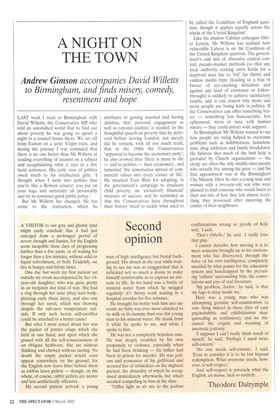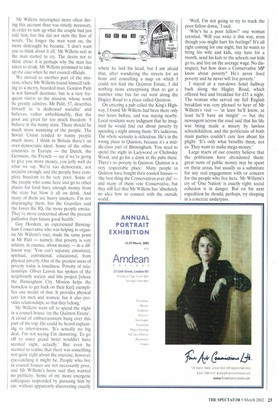A NIGHT ON THE TOWN
Andrew Gimson accompanies David Willetts
to Birmingham, and finds misery, comedy, resentment and hope
LAST week I went to Birmingham with David Willetts, the Conservative MP who told an astonished world that to find out about poverty he was going to spend a night in a council house there. We set off from Euston on a jerky Virgin train, and during the journey I was reminded that there is no one better than Mr Willetts at reading everything of interest on a subject and recapitulating what it says in a few lucid sentences. His early view of politics owed much to his intellectual gifts. 'I thought when I went into politics that you're like a Roman senator: you put on your toga and surrender all personality and try to construct good public policy.'
But Mr Willetts has changed. He has come to the realisation, which he attributes to getting married and having children, that 'personal engagement as well as rational analysis' is needed. In the thoughtful speech on poverty that he delivered before leaving London, not merely did he remark, with all too much truth, that in the 1980s the Conservatives 'appeared to become the economics party'; he also avowed that 'there is more to life — and to politics — than economics', and lamented 'the remorseless spread of commercial values into every corner of life'. He attacked Tony Blair for adopting, in the government's campaign to eradicate child poverty, an 'exclusively financial' measure of success, and he reminded us that the Conservatives have throughout their history 'tried to tackle what used to be called the Condition of England question, though it applies equally across the whole of the United Kingdom'.
Like his shadow Cabinet colleague Oliver Letwin, Mr Willetts has realised how vulnerable Labour is on the Condition of the United Kingdom question. The government's odd mix of obsessive central control, pseudo-market methods (so that any local authority seeking extra funds for a deprived area has to 'bid' for them) and endless media hype (leading to a bias in favour of eye-catching initiatives and against any kind of constancy or followthrough) is unlikely to achieve satisfactory results, and is one reason why more and more people are losing faith in politics. If the Conservatives can offer something better — something less bureaucratic, less ephemeral, more in tune with human nature — they could attract wide support.
In Birmingham Mr Willetts wanted to see how people are being helped to overcome problems such as indebtedness, homelessness, drug addiction and family breakdown. He believes that much of the best help is provided by Church organisations — the clergy are often the only middle-class people who actually live among the poor — and his first appointment was at the Birmingham City Mission. Here he met a young man and woman with a two-year-old son who were pleased to find someone who would listen to their sad tale of how they lost almost everything they possessed after incurring the enmity of their neighbours. Mr Willetts interrupted more often during this account than was strictly necessary, in order to sum up what the couple had just told him, but this did not stem the flow of words, The longer the man went on, the more distraught he became. 'I don't want you to think about it all.' Mr Willetts said as the man started to cry. The desire not to think about it is perhaps why the man has taken to drink. Mr Willetts promised to take up the case when he met council officials.
We moved to another part of the mission, where Mr Willetts found himself talking to a merry, bearded man. Gordon Palit is not himself destitute, but is a very frequent visitor to the mission, whose work he greatly admires. Mr Palit, 57, describes himself as 'a dedicated socialist' and believes, rather unfashionably, that the poor are given far too much freedom: 'I believe in the nanny state. There should be much more nannying of the people. The Soviet Union tended to nanny people much more. I think in Britain there's an over-democratic ideal. Some of the other countries in Europe — the Dutch, the Germans. the French — say if we're going to give you more money, you jolly well do what we say. We're too democratic, not socialist enough, and the people have complete freedom to be very poor. Some of the people who come here and go to other places for food have enough money from the state but blow it all on drink. And many of them are hemy smokers. I'm not disparaging them, but the Guardian said the lower the IQ, the more people smoke. They're more concerned about the present palliative than future good health.'
Guy Hordern, an experienced Birmingham Conservative who was helping to organise Mr Willetts's tour, made the same point as Mr Palit — namely, that poverty is very seldom, in essence, about money — in a different way: 'You can't separate emotional, spiritual, aspirational. educational, from physical poverty. One of the greatest areas of poverty today is loneliness. Poverty of relationships. Oliver Letwin has spoken of the neighbourly society and this project [where the Birmingham City Mission helps the homeless to get back on their feet] exemplifies one model of that. It provides physical care for men and women, but it also provides relationships, so that they belong.'
Mr Willetts went off to spend the night in a council house 'on the Quinton Estate'. A cloud of embarrassment hung over this part of his trip. He could be heard explaining to interviewers, 'It's actually no big deal. I'm not saying I'm slumming. To go off to some grand hotel wouldn't have seemed right, actually.' But even he seemed to realise that there was something not quite right about the exercise, however eye-catching it might be. People who live in council houses are not necessarily poor, and Mr Willetts's hosts said they wanted no publicity. Some of my more energetic colleagues responded by pursuing him by car. without apparently discovering exactly
where he laid his head. but I am afraid that, after wandering the streets for an hour and consulting a map on which I could not find the Quinton Estate, I did nothing more enterprising than to get a number nine bus far out west along the Hagley Road to a place called Quinton.
On entering a pub called the King's Highway. I found Mr Willetts had been there only two hours before, and was staying nearby. Local residents were indignant that he imagined he would find out about poverty by spending a night among them: 'It's ludicrous. The whole scenario is ridiculous. He's in the wrong place in Quinton, because it's a middle-class part of Birmingham. You need to spend the night in Ladywood or Chelmsley Wood, and go for a drink in the pubs there. There's no poverty in Quinton. Quinton is a very respectable place.' Many people in Quinton have bought their council houses — 'the best thing the Conservatives ever did' — and many of them vote Conservative, but they still feel that Mr Willetts has 'absolutely no idea how to connect with the outside world'. 'Well, I'm not going to try to track the poor fellow down,' I said.
'Why's he a poor fellow?' one woman retorted. Will you write it this way, even though you might hurt his feelings? It's all right coming for one night, but he wants to bring his wife and kids, stay here for a month, send his kids to the schools our kids go to, and live on the average wage. No disrespect, but how does a Conservative MP know about poverty? He's never lived poverty and he never will live poverty.'
I stayed at a run-down hotel halfway back along the Hagley Road, which offered bed and breakfast for £15 a night. The woman who served my full English breakfast was very pleased to hear of Mr Willetts's visit — 'at least he'll know, at least he'll have an insight' — but the newsagent across the road said that his life was being made a misery by lawless schoolchildren, and the politicians of both main parties couldn't care less about his plight: 'It's only what benefits them, not us. They want to make mega-money.'
Large tracts of our country believe that the politicians have abandoned them: great sums of public money may be spent on these areas, but usually as a substitute for any real engagement with or concern for the people who live here. Mr Willetts's cry of 'One Nation' is exactly right: social cohesion is in danger. But on his next expedition he should, perhaps, try sleeping in a concrete underpass.















































































 Previous page
Previous page